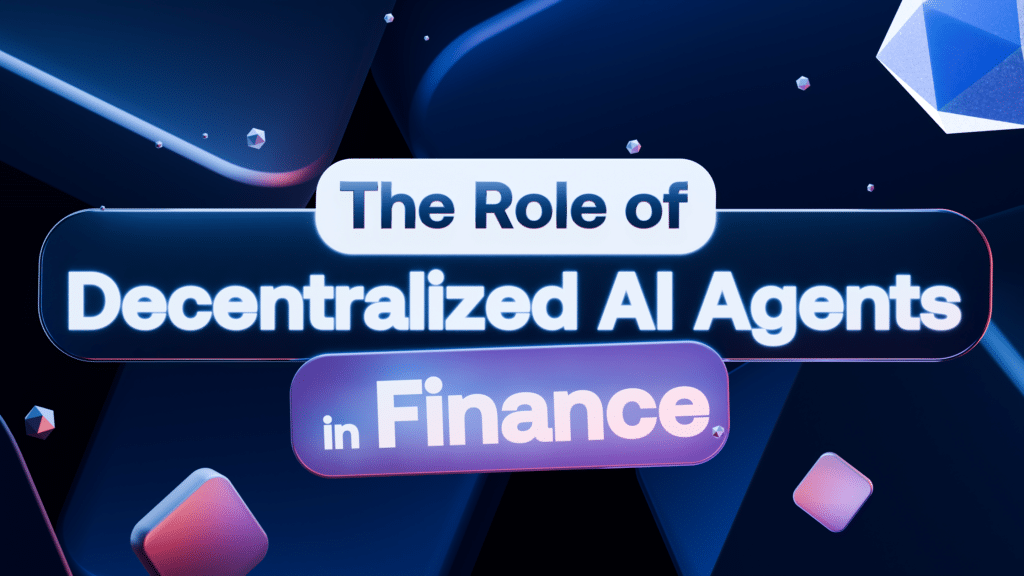
May 2, 2025 5 minutes read
The Role of Decentralized AI Agents in Finance

The financial industry has seen a lot of transformation in the age of AI. When AI agents came onto the scene, there was another level of transformation where customers began to experience seamless banking transactions, fast customer service, and access to resources they didn’t know they had access to. However, in this huge growth and development, there was still one huge problem: the entire system was still centralized. All the data accessible by the AI agents were controlled and stored in a central server. This created a potentially weak and highly destructive link in an industry as sensitive as the financial industry. Fortunately, the solution to this problem is not far-fetched or out of reach. With decentralized AI agents in finance, data is no longer stored on a central server, the main problem of any centralized system.
Redistributing the data across multiple servers is one of the ways decentralized AI agents in finance help to reduce the risk of potential attacks. But there’s more!
In this article, we will explore how decentralized AI agents in finance influence how much we carry out transactions and how they affect the safety of our financial assets.
Let’s get started!
What are decentralized AI agents?
Our previous post about decentralized AI exposed us to how decentralization works in artificial intelligence. In addition, we have discussed AI agents in many articles in the past. You can get more information about these topics from the link.
Essentially, AI agents are software systems that use artificial intelligence to accomplish goals and tasks on behalf of the user. They have a degree of autonomy and carry out tasks after reasoning, planning, and using information from their memory. They use historical data to predict challenges and come up with innovative solutions for these problems.
In finance, there is a lot of information and minimal time to process such information. That is why in the past, transactions and other financial activities took a lot of time. Luckily, nowadays, we have AI agents that assist in various tasks such as automating routine processes. The key to a functional AI agent is the amount of information they are exposed to. Financial information is sensitive one and in the wrong hands can cause a lot of havoc, and that is why using AI agents that are centralized is not the best.
Decentralized AI agents in finance operate independently across a distributed network rather than on a single centralized server. This approach creates a system for better data privacy since the data is distributed and stored across multiple nodes.
Furthermore, this approach gives users first-hand control over their data.
What is the role of decentralized AI agents in finance?
In November 2024, there was a data breach in the company that provides banking software solutions to over 8,000 financial institutions. The company, Finastra, lost over 400GB of sensitive data from its centralized AI infrastructure. Although the breach was discovered in November, the hackers had gained unauthorized access as early as October. Here, we can see that we need decentralized AI agents in finance as the cornerstone of the industry.
Let us see some of the roles of decentralized AI agents in finance
Data privacy and control
Traditional financial industries, like Finastra, store information centrally. From this central position, data is controlled, and AI agents are trained to get their information from this central server. Unfortunately, this centralized approach creates a single point of failure where all attacks are targeted. Decentralized AI agents operate from multiple independent nodes where data is distributed. It also uses technologies like homomorphic encryption which allows users to train models without necessarily exposing any of their sensitive information.
Reduced cost of transactions
Decentralized AI agents are semi-autonomous or completely autonomous. This allows them to automate financial services like lending and asset management through smart contracts instead of multiple intermediaries. By reducing the need for intermediaries, the costs of transactions are thereby reduced.
Enhanced transparency
Have you ever wondered how your transactions are processed? Well, you are certainly not alone. There have been a lot of cases where people lose their money in the system and no one can identify what happened to the money or where it went. Decentralized AI agents use blockchain networks for transactions for transparency. This ensures that all the transactions made on the blockchain are visible to the user and points of failure can be easily identified in cases of suspected theft.
More access and inclusion
In societies where traditional banking is not easily accessible, decentralized AI agents in finance can help bridge this gap. By introducing approaches such as peer-to-peer financial services, individuals have better access to loans and make purchases without needing a third-party institution. With decentralization governing this process, there is better security and a highly reduced risk of scams.
Limitations of decentralized AI agents in finance
Every new innovative technology has its limitations due to various factors. Here are some of the limitations of decentralized AI agents in the financial industry.
- Time and financial constraints
Decentralized AI agents operate via multiple nodes. Therefore, training each model for each node takes way more time when compared to training models in a centralized setting. In addition, it is also a highly complex process that, when combined with time, accrues a cost that may be too high, especially for startups. - Availability of data
Decentralized AI agents often lack comprehensive data when compared to their centralized counterparts. This comes in due to the protection of data where “overprotection” creates a situation where there is limited data for training the AI agents. - Governance and regulations
There is still no clear regulation around the use of decentralized AI agents in finance. Therefore, creating safe AI agents is a risk that most innovators may not be willing to take since regulations might spring up one day that completely go against their tools. Also, where regulations exist, they are so tight that they may hinder freethinking and innovation amongst creators.
Conclusion
For now, there are a very limited number of decentralized AI agents that operate in the finance industry. Fortunately, we have Openfabric AI, a decentralized Layer 1 AI platform that gives AI developers access to tools for the creation of AI agents that are applicable anywhere, including finance. The advanced architecture of Openfabric, which combines blockchain with cryptography, ensures that creators have the floor to create decentralized AI agents for the world to use in finance.
Let Openfabric AI be the canvas for you to showcase your innovative AI ideas to the world. The financial sector is in dire need of such innovations, and Openfabric is here to help you bring them into the world.
Gain access to these tools and more information on our WEBSITE today!

